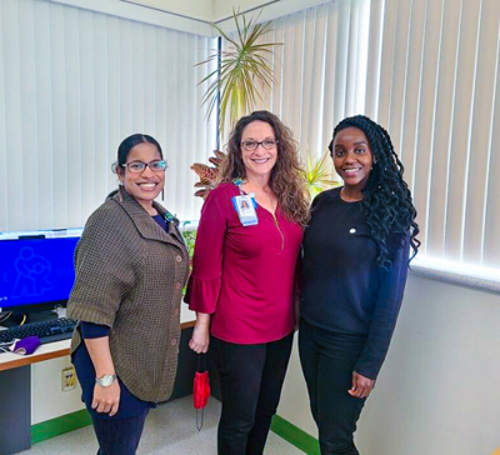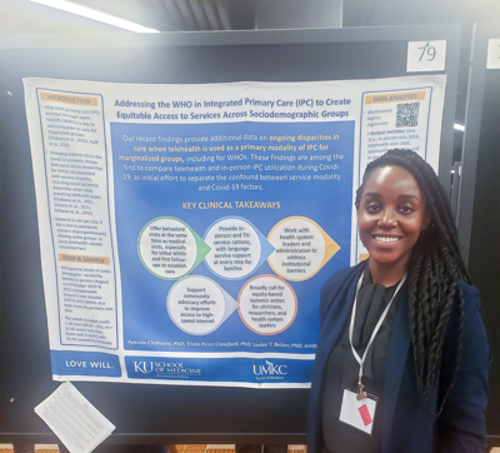Ayanda Chakawa, PhD
Associate Professor of Pediatrics, University of Missouri-Kansas City School of Medicine
Full Biography
As Children’s Mercy Research Institute (CMRI) grows its research programs, the institute has welcomed many innovative, early-career investigators to its roster of researchers. These investigators bring their novel ideas, unique talents, and diverse interests to CMRI. The following profile is one in our series on emerging principal investigators.
Ayanda Chakawa, PhD, Developmental and Behavioral Health, is both a clinical psychologist who provides behavioral health care to youth and a researcher interested in improving access to that care.
She is particularly interested in behavioral health care access issues for youth from historically marginalized populations. This includes those from Black, Indigenous, and People of Color (BIPOC) groups, socioeconomically disadvantaged backgrounds, and those from families with limited English language proficiency.
Dr. Chakawa leads the ACCESS (Adolescent and Child Centered Engagement to Supports and Services) Behavioral Health Lab. The lab team studies how embedding behavioral health care into primary care clinics impacts access.

They also study the impact that referring patients to other Children’s Mercy behavioral health clinics has on accessing care. In 2020, Dr. Chakawa, Leslee Belzer, PhD, Developmental & Behavioral Health, and Trista Perez Crawford, PhD, published an article based on their research supporting a multi-tiered integrated behavioral health care model to meet the needs of underserved sociodemographic groups. Dr. Chakawa, Dr. Belzer, Dr. Crawford, and Hung-Wen Yeh, PhD, Health Outcomes and Services Research, also published study results that indicated racial disparities in the use of telehealth for integrated primary care visits during COVID-19. Their research helped support a return to in-person integrated primary care clinical appointments.
Through her ACCESS Lab research and clinical experience at Children’s Mercy, Dr. Chakawa observed that many families faced challenges trying to navigate the behavioral health care system; this was even more pronounced for families whose child received a referral to another clinic for care. She wanted to address these challenges. In 2021, Dr. Chakawa received the Children’s Mercy Katharine Berry Richardson (KBR) award. With the KBR award funding, Dr. Chakawa began her research project, the PATHWAY (Promoting Access To Healthy Well-Being Across Youth) Behavioral Health Program, to address barriers to care by developing a culturally-relevant behavioral health care navigation model.
In 2022, Dr. Chakawa was named the first Diversity, Equity, and Inclusion Scholar in the Children’s Mercy Diversity, Equity and Inclusion Scholars Program. The goal of this program is to study the lack of diversity and inclusion in health care and the impact of health disparities on patients and families. Through the Diversity, Equity and Inclusion Scholar award, Dr. Chakawa expanded research staffing for the PATHWAY program and engaged parent consultants as research partners to inform the development and implementation of the PATHWAY program. “The Diversity, Equity and Inclusion Scholar award has provided increased protected time for me to research and build a clinical intervention that I’m passionate about,” said Dr. Chakawa. “I get to use my professional strengths to address a diversity, equity and inclusion-related public health crisis.”

The PATHWAY study involves piloting an individualized intervention to support families with behavioral health care navigation. Study participants are parents of youth referred to behavioral health services through primary care. The participants are from predominantly BIPOC and socioeconomically disadvantaged backgrounds and speak English or Spanish. The intervention follows participants for thirteen months and includes surveys and care navigation check-ins. During the check-ins, the study team conducts motivational interviews to clarify referral information, help set goals to obtain care, and assess family confidence in meeting those goals. “This study has created space for families to explain and for us to assess what the actual barriers are. Then, we can address these barriers,” said Dr. Chakawa. “Patient-family education is a huge component in this process.”
From development to implementation, community engagement is the foundation for this study. Dr. Chakawa partners with community members from the Children’s Mercy Mental Health and Consejo de Familias Latinas y Hispanas Parent Family Advisory Councils (PFACs). In addition to the PFACs providing consultation, four parents from the PFACs form a designated community advisory board to the PATHWAY study. These parents include Emily Hamm and Jamila Weaver from the Mental Health PFAC and Brenda Quintana and Bertha “Alicia” Aldape from the Consejo de Familias Latinas y Hispanas PFAC. “The community members involved provide feedback at every phase of the study,” said Dr. Chakawa. “Their voices are there, and that is a critical component of our study.”
The community members bring their personal experience to the study. “Dr. Chakawa’s research sheds light on something families have known for so long - behavior health system navigation is challenging and complex,” shared the PATHWAY study community advisory board. “We love the collaborative effort that has gone into the project and the opportunity to be part of the change. We hope more research is on the horizon. If the PATHWAY project is any indication of where the direction of mental health care access is going, we know families of the future will be grateful for what we are doing today.”
Although preliminary data is limited since the PATHWAY study is still ongoing, Dr. Chakawa has noticed some trends, including issues with system-level barriers like clinic paperwork requirements or communication issues that affect the navigation process. Another data trend is that social determinants of health impact both access to care and study engagement. These determinants include economic stability, education access, health care access, neighborhood environment, and social/community environment.
Dr. Chakawa’s long-term goal is to scale up the PATHWAY intervention to include more care navigation check-in opportunities for participants and to include staff dedicated to behavioral healthcare navigation throughout the health care system. She is applying for external grant funding to expand the study and its intervention.
In addition to her role at Children’s Mercy, Dr. Chakawa is an assistant professor at the University of Missouri-Kansas City School of Medicine. She joined Children’s Mercy in 2017 as an intern and then completed her fellowship in psychology in 2019. She received her PhD in clinical psychology from Auburn University, an MA in developmental psychology from the University of Alberta (Canada), and her BSc in psychology (with counseling emphasis) from Oakwood University, a historically black college/university in Huntsville, Ala.
